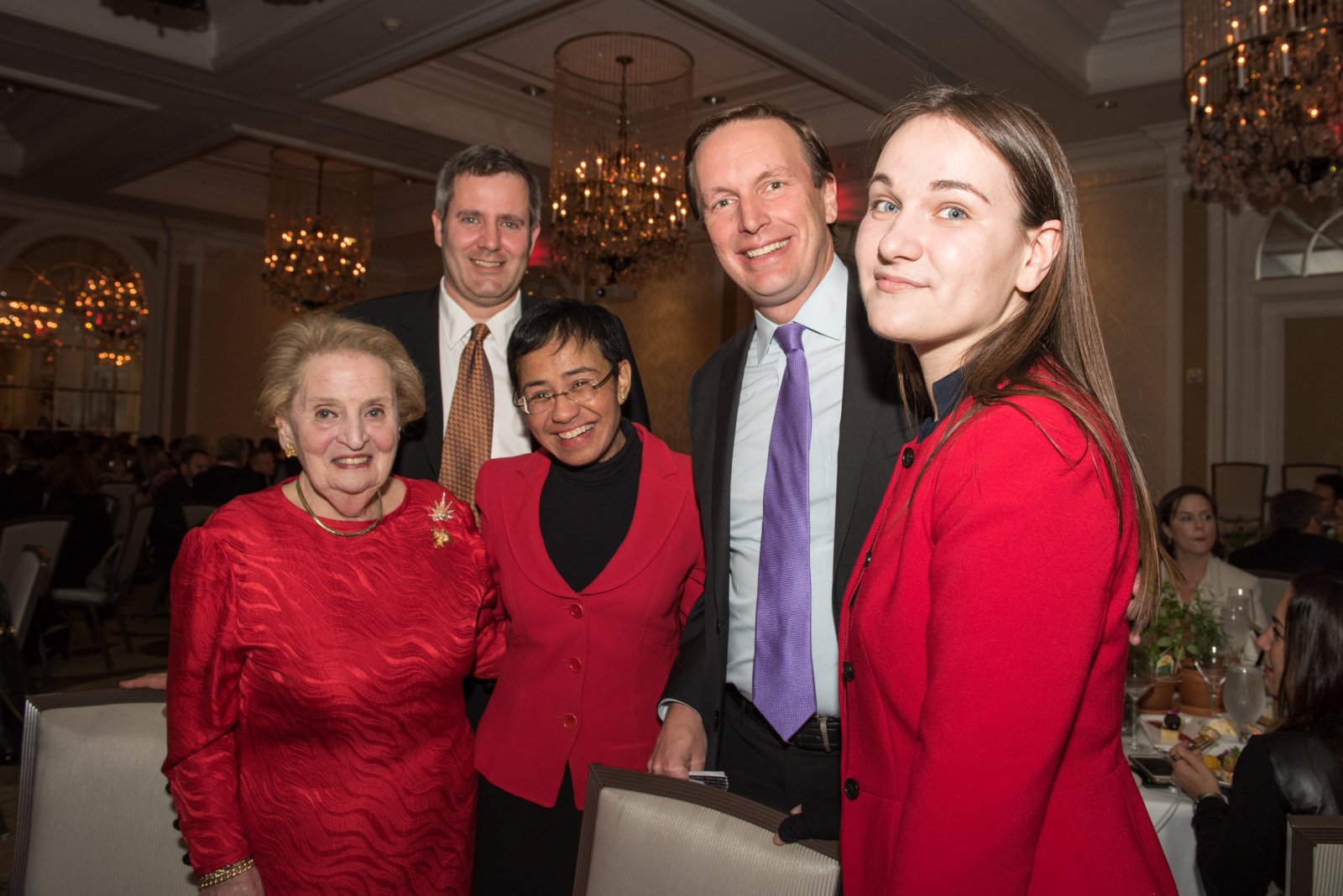
NDI 2017 Democracy Award recipients with Secretary Albright and Senator Murphy at the November 2 dinner in Washington D.C.: (left to right) Secretary Madeleine Albright, Dr. Phil Howard (Oxford Internet Institute), Maria Ressa (Rappler), Senator Chris Murphy (D-CT), Margo Gontar (StopFake.org). Photo credit: Margot Schulman
SHARE
ISSUES
Last night the National Democratic Institute (NDI) awarded its 2017 Democracy Award to three organizations at the forefront of the battle to combat disinformation at its annual Democracy Award Dinner in Washington, D.C. Entitled Disinformation vs. Democracy: Fighting for Facts, the evening’s discussion explored the threat of disinformation to democracy around the world.
While press coverage on disinformation has focused on Russian interference in the U.S. elections, the problem of disinformation is global in scale. Disinformation poisons democratic discourse, often making it difficult for citizens to distinguish between truth and fiction, or between genuine and manufactured social media conversations.
“In recent years, democracy’s enemies have become adept at polluting [social media] platforms with rumors, disinformation and anti-democratic propaganda. This has led some of the same people who once heralded the birth of the social media age to wonder whether democracy can survive it,” said NDI Chairman Madeleine Albright during her remarks. “Online discourse is becoming central to how people form their political identities, but the way information is transmitted is not often understood, nor is it entirely transparent – and that means it can be manipulated.”
The major offensive actions that have been mounted against [democracies] in the past decade have largely come through the militarization of information and the ability to do damage to us and our allies through technology.
U.S. Senator Chris Murphy
The sense that democracy has a real adversary in propagators of disinformation was prominent in each speaker’s remarks throughout the evening. In his keynote address, Senator Chris Murphy stressed this global threat and warned that a military response alone would no longer keep the enemies of democracy in check. “It’s the nonmilitary challenges to the world order that mount by the day… attackers still want to hit us,” said the senator from Connecticut. “The major offensive actions that have been mounted against [democracies] in the past decade have largely come through the militarization of information and the ability to do damage to us and our allies through technology.”
The 2017 awardees are organizations leading the charge against this threat all around the world. Rappler in the Philippines, StopFake.org in Ukraine and Oxford Internet Institute’s Project on Computational Propaganda in the United Kingdom were chosen because they work every day to protect the integrity of our information, to protect truth itself.
Rappler, an online social news network, has been on the front lines of investigative reporting in the Philippines on the use of “trolls” and social media “bots,” which are used to distort the truth and disseminate false news. Because of its pioneering reporting in this area, Rappler has itself become a target of disinformation efforts. Maria A. Ressa, its CEO and executive editor, accepted the award on behalf of the organization. “I fear that the pendulum of democracy is swinging the other way,” lamented Ressa. Then she added, dedicating the award to the hard work and courage of her colleagues at Rappler: “We are journalists and we will not be intimidated. We will shine the light. We will hold the line.”
We are journalists and we will not be intimidated. We will shine the light. We will hold the line.
Maria Ressa, Rappler
StopFake.org in Ukraine is a dedicated fact-checking website run by a group of Ukrainian journalists determined to fight the rising tide of propaganda originating from Russian sources. The purpose of the StopFake.org community is to check and verify facts and refute distorted information and propaganda about events in Ukraine. Margo Gontar, a co-founder and TV host, accepted the award on behalf of StopFake. She reflected: “Standing here brings me joy and sadness in the same time. Joy because… the voice of Ukraine is becoming louder, sadness because [disinformation] is no temporary issue, and this is not a Ukrainian-only issue.”
In early 2017, the Oxford Internet Institute’s (OII) Project on Computational Propaganda issued a groundbreaking study on the use of social media and computational propaganda to manipulate public opinion. Dr. Philip N. Howard, who accepted the award on behalf of OII, is the Principal Investigator for the Computational Propaganda Project. He warned, above all, that the threat of disinformation is largely in front of us, not behind us, but that overregulation of political speech is not the answer. “There is a foreign interest in creating confusion through campaigns of manipulation,” said Howard. However, “instead of censorship, we must find more ways to produce good, free political speech.”
Ken Wollack, NDI president commended all of the honorees on their tremendous work and presented NDI’s new INFO/tegrity initiative, which draws on experts and leaders from across sectors to identify, analyze, disrupt and counter disinformation. “What we all have in common is the understanding that what happens in one place, for good or evil, affects us all,” said Wollack in his remarks. “And in this interconnected world, we have a responsibility to help each other.”
Watch the video on disinformation that was shown at the dinner:
See the discussion on Twitter via #DisinfoVDem
Watch the entire program on ndi.org


